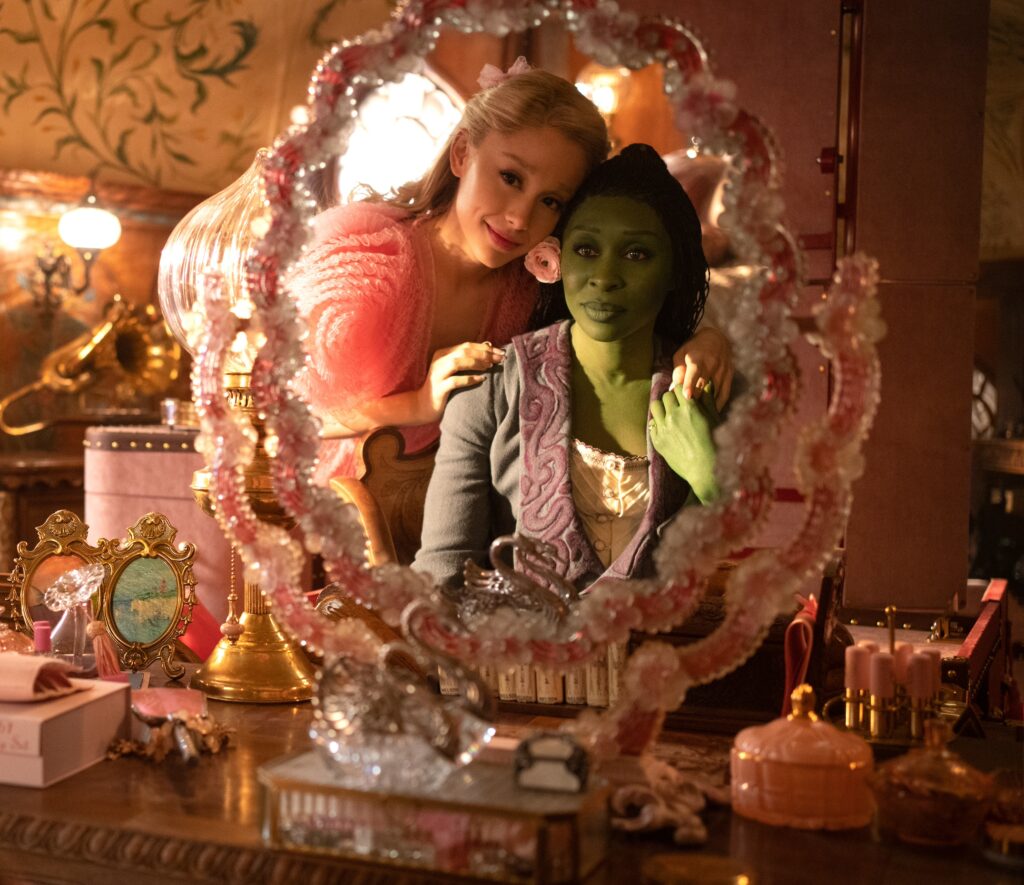One of the Best Hollywood Adaptations of a Broadway Show, ‘Wicked: Part One’ Adds to the Oz Legacy
Like ‘The Sound of Music’ (1965), ‘Wicked’ is a case where the movie builds upon the original, and in its own way even improves upon the stage version.

The most bandied-about term in contemporary film reviews is “spoiler alert.” One wonders what kind of spoilers we should be on the alert for when it comes to Jon M. Chu’s long-awaited “Wicked: Part One,” considering that more than 65 million people have seen the stage musical and another five million have read the original novel, “Wicked: The Life and Times of the Wicked Witch of the West.”
Yet well before Mr. Maguire’s 1995 novel, there wasn’t a person alive who didn’t already know the ending: Sweet little Dorothy Gale of Kansas vanquishes the Wicked West of the West.
There are no essential differences in any of the permutations of “Wicked”: Mr. Maguire’s novel, the 2003 Broadway musical adaptation, and the new movie, which basically takes the stage production as its starting point and incorporates other elements of the novel. Dorothy still conquers the witch, though in the show — and this really is a spoiler alert — the Wicked Witch escapes at the end and the rest of Oz only thinks she’s dead.
It remains to be seen whether the Wicked Witch, named Elphaba by Mr. Maguire and played wonderfully by Cynthia Erivo, will make it out alive in “Wicked: Part Two.” I tend to think the powers that be will go for the “Elphaba Lives” option, because, on the whole, the dramatic adaptations of “Wicked” are much lighter in tone than the novel. That’s not least because “Wicked: Part One” is a film adaptation of only Act One of the show, and most of the really dark stuff occurs in the second half.

Mr. Maguire’s book was a popular success but also well written enough to be taken as seriously as any major work in the fantasy or science fiction genre. At least part of what made “Wicked” acceptable to the more academic literary theorists, in a way that the original L. Frank Baum “Oz” books were not, is that in “Wicked,” nobody lives happily ever after.
Baum wrote no less than 13 sequels to his original 1900 story, and his successors brought the total up to nearly 40 books by mid-century. Yet before Mr. Maguire, no one had thought to write a prequel.
On the most basic level, the 1995 “Wicked” is the original prequel story — and as such, was prescient enough to anticipate an age of when most every franchise, from “Star Wars” to “The Sopranos,” has been given a prequel. “Wicked,” however, resonates strongly not least because it doesn’t spend a lot of its screen time on world-building and setting up the “Oz” tropes.
At its most basic level, “Wicked” is a very moving coming-of-age story, in a way that none of the other prequels are, and in a sense Glinda’s story is even more moving than Elphaba’s. Like Kristin Chenoweth before her, Ariana Grande does a brilliant job of conveying Glinda’s every thought, every revelation, leading to her increasing self-awareness and even social consciousness.
“Wicked” is also, famously, a tale of sisterhood and female bonding. Yet there’s much more to the story than just the philosophical implications — as Mr. Maguire famously said, he wrote it not to “explain” the Wicked Witch but rather to “deepen her mystery.”
He also intended “Wicked” as a contemplation of the nature of good and evil. “Are people born wicked?” Glinda asks in the opening number, “No One Mourns the Wicked,” paraphrasing Malvolio in “Twelfth Night.” Or do they have wickedness thrust upon them?
The political implications are perhaps even deeper; in “Wicked,” a highly entertaining conman achieves political power by spreading misinformation and encouraging his supporters to blame their problems on others — others who don’t look like them. Alas, that aspect of the story is more relevant at the current moment than some might have preferred.
As David Garrison, who played the Wizard in the original touring company, has observed, “Wicked” is all about “the politics of fear.” Even in this colorblind world of Oz, in which Blacks, whites, Asians, and others intermingle freely, they find another target to serve as victims of bias and prejudice. Dr. Dillamond, here voiced by Peter Dinklage, is quite literally a scapegoat in multiple senses of the word.
“Wicked: Part One” is easily one of the very best Hollywood adaptations of a Broadway musical. Generally, the movie is never as good as the show, but like “The Sound of Music” (1965), “Wicked” is a case where the movie adds to instead of removing from the original, and in its own way even improves upon the stage version.
Winnie Holzman expands upon her own libretto for the shooting script, and the movie is also enhanced through use of 21st-century visual effects, not least of which are the incredibly real-looking talking animals and a witch who literally defies gravity.
No one who loves any previous incarnation of “Wicked,” or even the larger, 125-year-old “Oz” mega-franchise itself, is likely to be in the least bit disappointed. “Wicked: Part One” has it all: heart, brains, and nerve.

